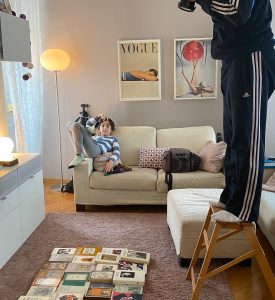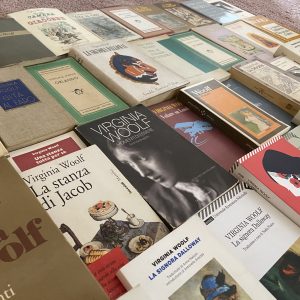[Clicca qui per leggere in Italiano]
When I wrote the “Risk Management Plan” of my project, I did not think of including “World Pandemic” as a possible risk. Well… my fault. But now that we all are in the middle of Covid-19 Pandemic, which is not exactly what you’re hoping for when you are given your once-in-a-life opportunity to travel around the world to do research and meet people, I had to reschedule my research plans. Entirely.
We still have no idea of what to expect for the future, but after 60 days closed in my house I made a decision. After a first period of hope, in which I thought that Governments would have been able to deal with it and I just had to wait and let it go, and a second period made of stress and black days in which I was getting more and more depressed at the idea that I was wasting THE Opportunity that I was given in my life, I tried to focus and remember one of my motto: fatto è meglio che perfetto (better done than perfect, no rhyme in English, sorry).
So although I am not working as I should and as I would like, I am trying to go on and I am now working on my Database.
I am buying all first Italian editions of Woolf’s books I find on eBay; I’m taking pictures of them; I’m collecting the metadata I will need for my Database; and I’m asking friends who own the books I don’t find to take pictures for me and send me the info they’ve got. This reminded me of the meeting I had with Pip Wilcox, who led the University of Oxford’s Centre for Digital Scholarship and collaborates as DH advisor with the University of Reading. I discussed the design and structure of my Database with her and she encouraged me and gave me useful advice such as: ask for help. This is always a good advice, but with DH I think it is simply impossible to work on your own. Together we decided to create the figure of ‘Contributors’ for my Database. Students, scholars, readers who want to take part in the ‘making of’ this big DB will have their role – not a big one, but still a role, which has been taken in consideration from the very design of the Database.
This idea might save part of my project now, because, not being able to travel around Italy and visit libraries, all I can do is ask for your help.
If you wrote anything on Woolf (scholarly articles, books, reviews…), if you are a collector of Woolf’s works, or if you would like to just collaborate, you might really be of great help with a little effort! So, if you are interested in being part of this, do write me, and I will explain how you can help.
Quando scrissi il “Risk Management Plan” del mio progetto, non pensai di includere “Pandemia Globale” come possibile rischio. Che dire, errore mio! Ma ora che siamo nel mezzo della Pandemia Covid-19 – che non è esattamente quello che speri quando ti viene data l’opportunità della vita per viaggiare per fare ricerca e incontrare gente – ho dovuto ripianificare completamente la mia ricerca.
Ancora non abbiamo idea di cosa aspettarci per il futuro, ma dopo 60 giorni chiusa in casa ho preso una decisione. Dopo un primo periodo di speranza, nel quale pensavo che i nostri governi sarebbero riusciti a gestire l’epidemia e io dovevo solo aspettare e accettare, e un secondo periodo fatto di stress e giornate nere in cui diventavo sempre più depressa all’idea che stavo sprecando L’UNICA Occasione che mi era stata data nella vita, ho cercato di concentrarmi e ricordare uno dei miei motti: fatto è meglio che perfetto.
Quindi, anche se non sto lavorando come dovrei e come vorrei, sto cercando di andare avanti e sto lavorando alla costruzione del mio Database.
Sto acquistando tutte le prime edizioni dei libri di Woolf tramite eBay; sto scattando foto ai libri; sto raccogliendo tutti i metadati che mi serviranno per il Database; e sto chiedendo ad amici e amiche che possiedono libri che io non trovo di scattare foto e spedirmi tutte le informazioni.
Questo mi ha ricordato del mio incontro con Pip Wilcox, che ha diretto il Centro di Digital Scholarship all’Università di Oxford e collabora come consulente delle DH con l’Università di Reading. Ho discusso con lei il design e la struttura del mio Database e lei mi ha incoraggiata e dato consigli utili come: chiedi aiuto. È sempre un buon consiglio, ma con le Digital Humanities credo sia semplicemente impossibile lavorare in solitudine. Così decidemmo insieme di creare la figura del ‘Contributor’ per il Database. Studenti, studiosi, ricercatori che volessero essere parte di questo progetto avranno il loro ruolo – non grandissimo, ma pur sempre un ruolo che è stato pensato dal design di partenza del DB.
Questa idea ora potrebbe in parte salvare il mio progetto, perché non potendo viaggiare per l’Italia per consultare tutte le biblioteche possibili, tutto quello che mi rimane da fare è chiedere il vostro aiuto.
Se hai scritto qualcosa su Woolf (articoli accademici, libri, recensioni…), se sei un/a collezionista dei suoi libri, o se semplicemente ti piacerebbe collaborare, potresti davvero essermi di aiuto con un piccolissimo sforzo! Quindi se ti interessa essere parte del progetto scrivimi, e ti spiegherò come puoi aiutarmi.



